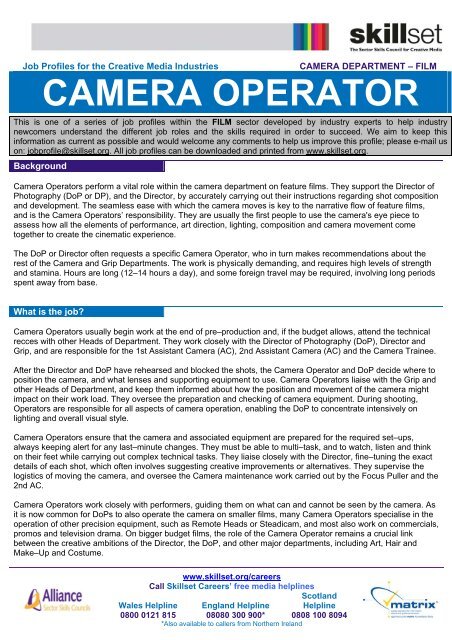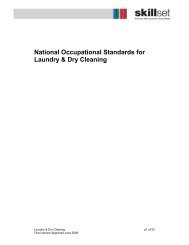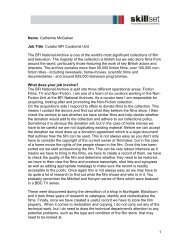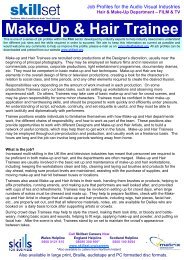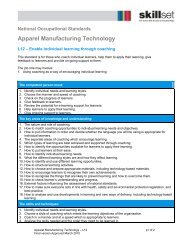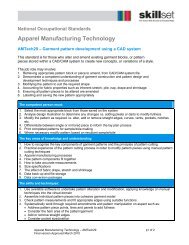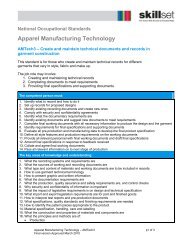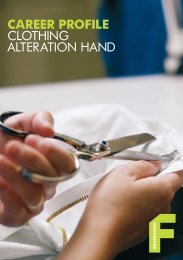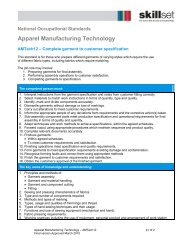Camera Operator - Film - Skillset
Camera Operator - Film - Skillset
Camera Operator - Film - Skillset
Create successful ePaper yourself
Turn your PDF publications into a flip-book with our unique Google optimized e-Paper software.
Job Profiles for the Creative Media Industries<br />
CAMERA DEPARTMENT – FILM<br />
CAMERA OPERATOR<br />
This is one of a series of job profiles within the FILM sector developed by industry experts to help industry<br />
newcomers understand the different job roles and the skills required in order to succeed. We aim to keep this<br />
information as current as possible and would welcome any comments to help us improve this profile; please e-mail us<br />
on: jobprofile@skillset.org. All job profiles can be downloaded and printed from www.skillset.org.<br />
Background<br />
<strong>Camera</strong> <strong>Operator</strong>s perform a vital role within the camera department on feature films. They support the Director of<br />
Photography (DoP or DP), and the Director, by accurately carrying out their instructions regarding shot composition<br />
and development. The seamless ease with which the camera moves is key to the narrative flow of feature films,<br />
and is the <strong>Camera</strong> <strong>Operator</strong>s’ responsibility. They are usually the first people to use the camera's eye piece to<br />
assess how all the elements of performance, art direction, lighting, composition and camera movement come<br />
together to create the cinematic experience.<br />
The DoP or Director often requests a specific <strong>Camera</strong> <strong>Operator</strong>, who in turn makes recommendations about the<br />
rest of the <strong>Camera</strong> and Grip Departments. The work is physically demanding, and requires high levels of strength<br />
and stamina. Hours are long (12–14 hours a day), and some foreign travel may be required, involving long periods<br />
spent away from base.<br />
What is the job<br />
<strong>Camera</strong> <strong>Operator</strong>s usually begin work at the end of pre–production and, if the budget allows, attend the technical<br />
recces with other Heads of Department. They work closely with the Director of Photography (DoP), Director and<br />
Grip, and are responsible for the 1st Assistant <strong>Camera</strong> (AC), 2nd Assistant <strong>Camera</strong> (AC) and the <strong>Camera</strong> Trainee.<br />
After the Director and DoP have rehearsed and blocked the shots, the <strong>Camera</strong> <strong>Operator</strong> and DoP decide where to<br />
position the camera, and what lenses and supporting equipment to use. <strong>Camera</strong> <strong>Operator</strong>s liaise with the Grip and<br />
other Heads of Department, and keep them informed about how the position and movement of the camera might<br />
impact on their work load. They oversee the preparation and checking of camera equipment. During shooting,<br />
<strong>Operator</strong>s are responsible for all aspects of camera operation, enabling the DoP to concentrate intensively on<br />
lighting and overall visual style.<br />
<strong>Camera</strong> <strong>Operator</strong>s ensure that the camera and associated equipment are prepared for the required set–ups,<br />
always keeping alert for any last–minute changes. They must be able to multi–task, and to watch, listen and think<br />
on their feet while carrying out complex technical tasks. They liaise closely with the Director, fine–tuning the exact<br />
details of each shot, which often involves suggesting creative improvements or alternatives. They supervise the<br />
logistics of moving the camera, and oversee the <strong>Camera</strong> maintenance work carried out by the Focus Puller and the<br />
2nd AC.<br />
<strong>Camera</strong> <strong>Operator</strong>s work closely with performers, guiding them on what can and cannot be seen by the camera. As<br />
it is now common for DoPs to also operate the camera on smaller films, many <strong>Camera</strong> <strong>Operator</strong>s specialise in the<br />
operation of other precision equipment, such as Remote Heads or Steadicam, and most also work on commercials,<br />
promos and television drama. On bigger budget films, the role of the <strong>Camera</strong> <strong>Operator</strong> remains a crucial link<br />
between the creative ambitions of the Director, the DoP, and other major departments, including Art, Hair and<br />
Make–Up and Costume.<br />
www.skillset.org/careers<br />
Call <strong>Skillset</strong> Careers’ free media helplines<br />
Scotland<br />
Wales Helpline<br />
0800 0121 815<br />
England Helpline<br />
08080 300 900*<br />
Helpline<br />
0808 100 8094<br />
*Also available to callers from Northern Ireland
Typical career routes<br />
CAMERA OPERATOR – CAMERA DEPARTMENT – FILM<br />
Most <strong>Camera</strong> <strong>Operator</strong>s begin their careers as <strong>Camera</strong> Trainees or Runners, progressing to 2nd AC and, as they<br />
gain more experience, to 1st AC. Throughout this progression, they must build upon their experience, and achieve<br />
a high level of competence when operating a variety of cameras. Once this level of expertise and experience has<br />
been achieved, they may become a DoP or a <strong>Camera</strong> <strong>Operator</strong>.<br />
Essential knowledge & skills<br />
<strong>Camera</strong> <strong>Operator</strong>s need advanced technical abilities, combined with creative skills, and must know how to operate<br />
the camera to achieve the desired result. They need a good working knowledge of all camera systems, lenses and<br />
camera support equipment; of available accessories such as remote focus systems, video senders and receivers,<br />
and of any other regularly used equipment. Creative input and artistic ability are vital. As the decision–making<br />
process may take some time, patience is also essential.<br />
Key skills include:<br />
<br />
<br />
<br />
<br />
<br />
<br />
<br />
<br />
a good sense of visual composition, perspective and movement<br />
physical co–ordination and strength<br />
ability to combine creativity with technical skills<br />
precise attention to detail<br />
effective communication skills<br />
ability to collaborate, and to work as part of a team<br />
diplomacy and sensitivity when working with artists and crew<br />
knowledge of the requirements of the relevant Health and Safety legislation and procedures.<br />
Training and qualifications<br />
No specific qualifications are required to work in this role, although film schools and training courses offer a good<br />
basic grounding in the skills and knowledge required and in practice many <strong>Camera</strong> <strong>Operator</strong>s have studied for<br />
higher level qualifications. The most useful courses offer practical experience and may also include work<br />
experience placements. Relevant courses include City & Guilds courses, BTEC HNC/HNDs, Foundation degrees,<br />
first degrees and postgraduate qualifications in media, film and TV production or cinematography. Basic stills<br />
photography, which develops visual and composition skills, also provides a useful starting point in training for this<br />
role.<br />
<strong>Camera</strong> <strong>Operator</strong>s usually learn most of their practical skills through hands–on experience on the job. However,<br />
continual professional development is vital, especially as technology changes rapidly. The National <strong>Film</strong> and<br />
Television School offers industry recognised short courses for all grades. New shooting techniques, lighting set–<br />
ups and other practices are learnt by testing out new equipment, studying trade journals, attending exhibitions and<br />
joining industry forums.<br />
There are some industry led new entrant training schemes, which offer a training allowance and combine industry<br />
placements with short course training opportunities. These include schemes offered by Cyfle and Scottish Screen,<br />
and FT2 – <strong>Film</strong> and Television Training – camera assistant. Competition for places is fierce.<br />
Skillet’s network of Screen Academies are institutions that it has identified as offering the highest quality of film<br />
skills training. Details are available on the <strong>Skillset</strong> website: http://www.skillset.org/training/san/ssa/<br />
Where to go for more information<br />
<strong>Skillset</strong> is the Sector Skills Council for Creative Media. The first sources of information for all jobs in the industry<br />
are the National Occupational Standards. Browse <strong>Skillset</strong>’s website for links to our network of training partners,<br />
information about training and access to the comprehensive <strong>Skillset</strong>/BFI course database. Finally, <strong>Skillset</strong> Careers<br />
is the UK’s only specialist media careers advice service; for detailed media careers information and advice, visit<br />
www.skillset.org/careers.<br />
<strong>Skillset</strong> does not endorse or accept responsibility for any of the products, services or content of third party<br />
organisations or websites contained within this Job Profile, nor does it guarantee the quality of links to the<br />
external websites listed. Any concerns regarding an external link should be directed to its webmaster.<br />
Also available in large print, Braille, audiotape and PC formatted disc formats.
CAMERA OPERATOR – CAMERA DEPARTMENT – FILM<br />
Websites<br />
The British Society of Cinematographers www.bscine.com<br />
The Broadcasting Entertainment Cinematograph and Theatre Union (BECTU) www.bectu.org.uk<br />
The Cinematography mailing list www.cinematography.net<br />
Cyfle, the Welsh training company for film, television and interactive media www.cyfle.co.uk<br />
The Guild of British <strong>Camera</strong> Technicians www.gbct.org<br />
FT2 - <strong>Film</strong> & Television Freelance Training www.ft2.org.uk<br />
The Moving Image Society (BKSTS) http://nt12.orbital.net/bksts/about.asp<br />
Scottish Screen, the national development agency for the screen industries in Scotland www.scottishscreen.com<br />
The Steadicam <strong>Operator</strong>s Association www.steadicam-ops.com<br />
Publications<br />
American Cinematographer www.theasc.com<br />
High Definition www.definitionmagazine.com<br />
Sight and Sound www.bfi.org.uk/sightandsound<br />
Glossary<br />
• Director of Photography is also sometimes known as Cinematographer.<br />
• A recce is a reconnaissance (inspection) of a location before shooting.<br />
<strong>Skillset</strong> does not endorse or accept responsibility for any of the products, services or content of third party<br />
organisations or websites contained within this Job Profile, nor does it guarantee the quality of links to the<br />
external websites listed. Any concerns regarding an external link should be directed to its webmaster.<br />
Also available in large print, Braille, audiotape and PC formatted disc formats.


